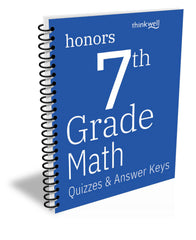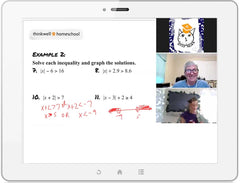










Honors 7th Grade Math Online Course
$169.00
Challenge your student with math that builds confidence and sparks curiosity.
Thinkwell’s Honors 7th Grade Math challenges advanced learners with a faster pace and expanded content. Featuring 300+ dynamic video lessons from award-winning teacher Edward Burger, the course builds deeper understanding, strengthens problem-solving, and prepares students for algebra and beyond.
Everything is included—interactive practice, worksheets, reviews, quizzes, tests, and built-in gradebook and tracking tools. For extra convenience, optional printed Companion Books are available. Preview Volume One here.
⭐ New! Studdy Buddy — your student’s built-in math tutor. They’ll get step-by-step help on practice problems anytime they need it—included free with every course. Learn more about Studdy Buddy here.
Not sure if Honors is the right fit? Compare it with our standard 7th Grade Math here, or read about the differences between the two here.
Challenge your student, boost their confidence, and prepare them for advanced math success with Thinkwell’s Honors 7th Grade Math.










